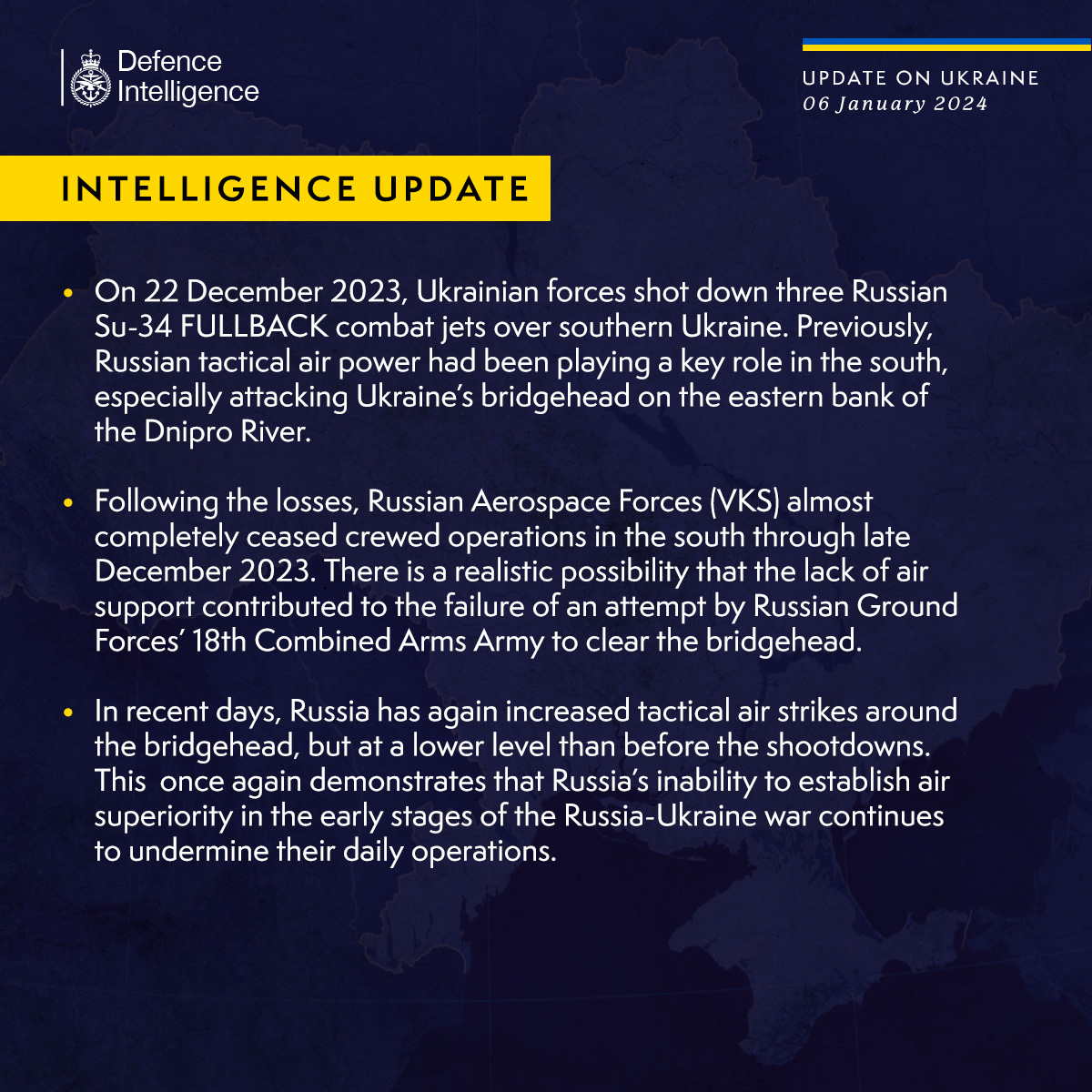Two weeks after the Russian Aerospace Forces (VKS) lost Su-34 fighter jets to Ukrainian air defenses, an intelligence update released by the UK Ministry of Defense (UK MoD) claims that RuAF operations have been hampered due to losses.
The intelligence update published on January 6 noted that it had impacted Russian operations in Kherson Oblast on the left bank of the Dnipro River.
In its assessment, the UK MoD observed that before the attack, Russian tactical air power was instrumental in the southern Ukrainian region, especially in attempting to strike Ukraine’s bridgehead on the eastern bank of the Dnipro River.
Earlier, on December 22, Ukrainian Air Force commander Mykola Oleshchuk said the Su-34 Fullback jets were downed around noon that day. Soon after the incident, there were reports that the Russian forces had started decreasing their air campaign and the use of glide bombs after the reported shootdowns.
In its latest assessment, the British Intelligence update noted that Russian Aerospace Forces (VKS/RuAF) virtually stopped crewed operations in the south through late December 2023 due to the casualties.
“There is a realistic possibility that the lack of air support contributed to the failure of an attempt by Russian Ground Forces’ 18th Combined Arms Army to clear the bridgehead,” UK Defence Intelligence believes.
Kostyantyn Mashovets, a Ukrainian military observer quoted by ISW, stated on December 24 that Russian forces were limiting the use of manned aviation in the vicinity of Crimea, namely in the northwest Black Sea region.
The report also featured remarks made on December 23 by Lieutenant Colonel Volodymyr Fityo, the spokesperson for the Ukrainian ground forces, who claimed that the Russian troops had reduced their aviation activities while stepping up their use of strike drones in the eastern Ukrainian regions of Bakhmut and Kupiansk.
At the time, ISW highlighted the possibility of more unobstructed operations by Ukrainian forces on the west bank of the Dnipro River as a result of the persistent decrease in Russian glide bomb strikes in Kherson Oblast.
The ISW report further added that Russian forces employ glide bomb strikes to keep Russian aircraft positioned 50 to 70 kilometers behind the frontline of combat engagement. The reduced use of glide bombs by Russia indicated a heightened concern among Russian forces regarding Ukrainian air defense capabilities in the aftermath of the losses.
The latest British intelligence adds that if the Ukrainian high command makes choices, it might provide them with a more stable position on the East Bank for future projects.
It further stated that “at a lower level than before the shootdowns” of the Su-34s, Russia has recently resumed tactical airstrikes in the vicinity of the Ukrainian bridgehead on the left bank of the Dnipro River.
In its conclusion, the UK Intelligence noted — “This once again demonstrates that Russia’s inability to establish air superiority (despite best of warplanes and strategic bombers) in the early stages of the Russia-Ukraine war continues to undermine their daily operations,” the review concludes.
The report comes at a time when the Russians have launched a massive aerial strike against Ukraine, making use of its air-launched cruise and ballistic missiles as well as the hypersonic aero ballistic missile Kinzhal. However, the Ukrainian air defense forces have claimed to intercept most of these missiles that have been aimed at Ukraine’s military-industrial infrastructure.
On the other hand, Ukrainian air power is set to benefit immensely as the country expects the delivery of promised F-16 fighter jets ‘soon’ enough.
F-16s Are Coming To Ukraine Soon!
The defense minister of Ukraine stated that his nation anticipates receiving the cutting-edge F-16 fighter jets “soon.” Meanwhile, the Biden administration forewarned Congress that if it does not assist Ukraine, it may have to pay a heavy price in the future in terms of “national treasure and American blood.”
In remarks on December 8, Ukrainian Defense Minister Rustem Umerov emphasized that “we will receive them soon” and that plans were well on to obtain the cutting-edge fighters built in the United States.
To counter Russia’s air superiority in the areas of Ukraine that Russian forces have taken over, Kyiv has repeatedly pleaded with its partners to supply the necessary aircraft.
“In the short term, we will receive the F-16s,” Umerov said. “In the medium term, we have also made more orders for our defense forces. I mean the years 2027 to 2030.”
Meanwhile, Speaking to Republican legislators in Washington on December 8, US National Security Council spokesperson John Kirby said that the current debate over the matter was “a great gift” to Russian President Vladimir Putin and urged them to approve more military aid for Ukraine.
“If you think the cost of supporting Ukraine is high now, think about…how high it’s going to be in national treasure and American blood if we have to start acting on our Article 5 commitments,” he said, referring to the clause in the NATO Charter requiring members to defend one another.
“If [Putin] gets Ukraine, he gets right up against the doorstep of NATO,” Kirby said. “Helping [Ukraine] win this war is very much in our national security interest and the national security interest of all our allies in Europe.
- Contact the author at sakshi.tiwari9555 (at) gmail.com
- Follow EurAsian Times on Google News
